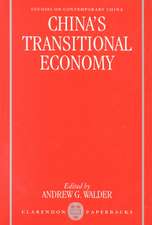Gramsci's Critique of Civil Society: Towards a New Concept of Hegemony: Routledge Studies in Social and Political Thought
Autor Marco Fonsecaen Limba Engleză Hardback – 4 apr 2016
Antonio Gramsci was an Italian Marxist thinker whose radical ideas on how to build an alternative world from below remain vigorously relevant today. Gramsci s philosophy of praxis critically dissects the institutions of modern liberal democracy to reveal what is perhaps its deepest secret: it is the most successful political system in modernity at preserving an objective condition of domination while transforming it into a subjective conviction of freedom.
Based on a careful reading of Gramsci's The Prison Notebooks, Marco Fonseca shows hegemony as more than leadership of elites over subaltern majorities based on "consent." Following Gramsci s critique of citizenship, civil society and democracy, including the current project of neoliberal "democracy promotion" particularly in the Global South, he discloses a hidden process of hegemony that generates the preconditions for consent and, thus, successful domination.
As the struggles from Zapatismo to Chavismo and from the Arab Springs to Spain s Podemos show, liberation is not possible without counter-hegemony. This book will be of interest to activist scholars engaged in the study of Marxism, Gramsci, political philosophy, and contemporary debates about the renewal of Marxist thought and the relevance of revolution and Communism for the twenty-first century.
"
Din seria Routledge Studies in Social and Political Thought
-
 Preț: 152.42 lei
Preț: 152.42 lei -
 Preț: 296.64 lei
Preț: 296.64 lei -
 Preț: 380.89 lei
Preț: 380.89 lei -
 Preț: 310.96 lei
Preț: 310.96 lei -
 Preț: 287.67 lei
Preț: 287.67 lei -
 Preț: 347.92 lei
Preț: 347.92 lei -
 Preț: 303.87 lei
Preț: 303.87 lei -
 Preț: 333.32 lei
Preț: 333.32 lei -
 Preț: 309.82 lei
Preț: 309.82 lei -
 Preț: 324.20 lei
Preț: 324.20 lei -
 Preț: 221.84 lei
Preț: 221.84 lei -
 Preț: 310.41 lei
Preț: 310.41 lei -
 Preț: 319.01 lei
Preț: 319.01 lei -
 Preț: 311.70 lei
Preț: 311.70 lei -
 Preț: 319.08 lei
Preț: 319.08 lei -
 Preț: 311.41 lei
Preț: 311.41 lei -
 Preț: 338.98 lei
Preț: 338.98 lei -
 Preț: 216.44 lei
Preț: 216.44 lei -
 Preț: 279.47 lei
Preț: 279.47 lei -
 Preț: 347.24 lei
Preț: 347.24 lei -
 Preț: 387.02 lei
Preț: 387.02 lei - 18%
 Preț: 1110.47 lei
Preț: 1110.47 lei - 18%
 Preț: 1055.51 lei
Preț: 1055.51 lei - 18%
 Preț: 1058.43 lei
Preț: 1058.43 lei - 18%
 Preț: 1005.73 lei
Preț: 1005.73 lei - 25%
 Preț: 544.67 lei
Preț: 544.67 lei -
 Preț: 409.73 lei
Preț: 409.73 lei - 18%
 Preț: 1061.22 lei
Preț: 1061.22 lei - 18%
 Preț: 1061.84 lei
Preț: 1061.84 lei - 18%
 Preț: 1215.71 lei
Preț: 1215.71 lei - 18%
 Preț: 998.71 lei
Preț: 998.71 lei - 18%
 Preț: 1109.99 lei
Preț: 1109.99 lei -
 Preț: 488.71 lei
Preț: 488.71 lei - 30%
 Preț: 847.73 lei
Preț: 847.73 lei -
 Preț: 416.12 lei
Preț: 416.12 lei - 18%
 Preț: 1054.75 lei
Preț: 1054.75 lei - 28%
 Preț: 769.72 lei
Preț: 769.72 lei - 18%
 Preț: 1059.84 lei
Preț: 1059.84 lei -
 Preț: 489.99 lei
Preț: 489.99 lei - 18%
 Preț: 1062.31 lei
Preț: 1062.31 lei - 18%
 Preț: 1108.42 lei
Preț: 1108.42 lei -
 Preț: 382.65 lei
Preț: 382.65 lei - 42%
 Preț: 181.06 lei
Preț: 181.06 lei - 26%
 Preț: 822.36 lei
Preț: 822.36 lei - 18%
 Preț: 1219.38 lei
Preț: 1219.38 lei
Preț: 819.48 lei
Preț vechi: 1102.53 lei
-26% Nou
156.80€ • 163.72$ • 129.78£
Carte tipărită la comandă
Livrare economică 04-18 aprilie
Specificații
ISBN-10: 1138185876
Pagini: 224
Dimensiuni: 152 x 229 x 18 mm
Greutate: 0.43 kg
Ediția:1
Editura: Taylor & Francis
Colecția Routledge
Seria Routledge Studies in Social and Political Thought
Locul publicării:Oxford, United Kingdom
Public țintă
Postgraduate and UndergraduateCuprins
Recenzii
Peter Hallward, Kingston University London, UK
'Fonseca’s book is well written and gives us very useful insights on reading Gramsci. One of the great advantages of this book is its clear structure and the way it provides detailed information onThe Prison Notebooks, which makes it very valuable to anyone who is interested in Gramsci.'
Ecem Karlidag, Political Studies Review
Descriere
Antonio Gramsci was an Italian Marxist thinker whose radical ideas on how to build an alternative world from below remain vigorously relevant today. Gramsci s philosophy of praxis critically dissects the institutions of modern liberal democracy to reveal what is perhaps its deepest secret: it is the most successful political system in modernity at preserving an objective condition of domination while transforming it into a subjective conviction of freedom.
Based on a careful reading of Gramsci's The Prison Notebooks, Marco Fonseca shows hegemony as more than leadership of elites over subaltern majorities based on "consent." Following Gramsci s critique of citizenship, civil society and democracy, including the current project of neoliberal "democracy promotion" particularly in the Global South, he discloses a hidden process of hegemony that generates the preconditions for consent and, thus, successful domination.
As the struggles from Zapatismo to Chavismo and from the Arab Springs to Spain s Podemos show, liberation is not possible without counter-hegemony. This book will be of interest to activist scholars engaged in the study of Marxism, Gramsci, political philosophy, and contemporary debates about the renewal of Marxist thought and the relevance of revolution and Communism for the twenty-first century.
"
















